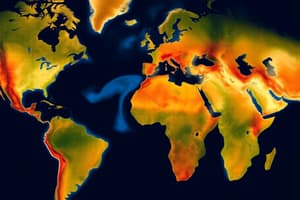Podcast
Questions and Answers
What is a key characteristic of regions with a continental climate?
What is a key characteristic of regions with a continental climate?
- Proximity to large bodies of water
- Moderate temperature variations (correct)
- High levels of rainfall
- Low humidity
Why do marine climates tend to have mild temperatures?
Why do marine climates tend to have mild temperatures?
- The ocean has a low heat capacity, keeping the temperatures stable.
- The ocean releases heat only during hot periods, leading to mild temperatures.
- The ocean acts as a heat sink, absorbing and releasing heat to moderate the temperature. (correct)
- The ocean has a high heat capacity, causing extreme temperature fluctuations.
Why do cold climates experience significantly low temperatures during winter months?
Why do cold climates experience significantly low temperatures during winter months?
- The angle of the sun's rays is lower (correct)
- Because they are closer to the equator
- Receiving more direct sunlight
- Due to high humidity levels
What is the primary reason for the ocean moderating the temperature in marine climates?
What is the primary reason for the ocean moderating the temperature in marine climates?
Which type of climate is characterized by a lack of humidity in the air?
Which type of climate is characterized by a lack of humidity in the air?
How does the ocean contribute to preventing extreme temperature fluctuations in coastal areas?
How does the ocean contribute to preventing extreme temperature fluctuations in coastal areas?
What role does the ocean play in maintaining relatively warm climates during cooler seasons?
What role does the ocean play in maintaining relatively warm climates during cooler seasons?
What sets temperate climates apart from dry climates?
What sets temperate climates apart from dry climates?
Why do regions with a marine climate receive more frequent precipitation?
Why do regions with a marine climate receive more frequent precipitation?
How does the ocean's property of high heat capacity influence the surrounding climate?
How does the ocean's property of high heat capacity influence the surrounding climate?
In marine climates, why does rainfall vary depending on the specific location?
In marine climates, why does rainfall vary depending on the specific location?
What distinguishes cold climates from continental climates?
What distinguishes cold climates from continental climates?
Flashcards are hidden until you start studying
Study Notes
Continental Climate Characteristics
- Characterized by significant temperature variations between summer and winter.
- Experience greater temperature extremes compared to coastal regions due to distance from oceans.
Marine Climate Temperatures
- Mild temperatures result from the ocean's ability to store heat and release it slowly.
- Coastal areas see less temperature fluctuation compared to inland regions.
Cold Climate Low Temperatures
- Significantly low winter temperatures stem from factors like geographical location, elevation, and reduced sunlight.
- Often associated with polar regions and high-latitude areas.
Ocean's Role in Marine Climate
- Ocean acts as a thermal buffer, preventing extreme temperature changes.
- High heat capacity of the ocean allows it to absorb and release heat gradually.
Dry Climate Humidity
- Characterized by low humidity levels due to limited moisture in the air.
- Often found in arid and semi-arid regions.
Ocean's Influence on Coastal Temperatures
- Ocean water helps maintain steady temperatures, preventing rapid cooling or heating.
- Contributes to overall climate stability in coastal regions.
Ocean and Seasonal Warmth
- Oceans retain heat during warmer months and release it during cooler months, resulting in milder winters.
- Helps sustain a relatively warm climate in areas adjacent to large bodies of water.
Temperate vs. Dry Climates
- Temperate climates generally feature higher humidity and moderate precipitation.
- Dry climates experience low moisture levels and significant evaporation, leading to aridity.
Marine Climate Precipitation
- Marine climates receive frequent precipitation due to prevailing winds carrying moisture from the ocean.
- Coastal location contributes to higher humidity and thus more rain.
Ocean's Heat Capacity Effect
- High heat capacity of the ocean moderates temperatures by absorbing heat in summer and releasing it in winter.
- Influences weather patterns and climate stability in adjacent areas.
Rainfall Variation in Marine Climates
- Rainfall in marine climates varies by geographic features like mountains and prevailing winds.
- Specific locations may experience differences in precipitation due to their topographical influences.
Cold vs. Continental Climates
- Cold climates have extreme winter conditions and may lack the seasonal temperature swings found in continental climates.
- Continental climates experience more drastic seasonal changes, while cold climates are defined by their overall temperature profiles.
Studying That Suits You
Use AI to generate personalized quizzes and flashcards to suit your learning preferences.




